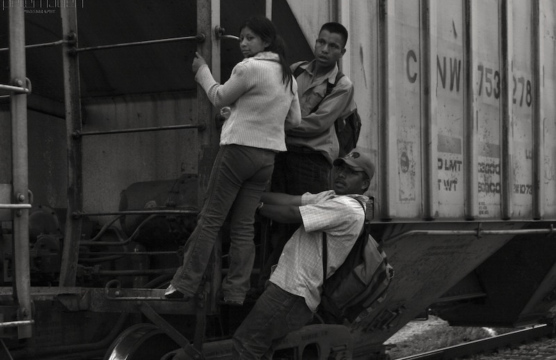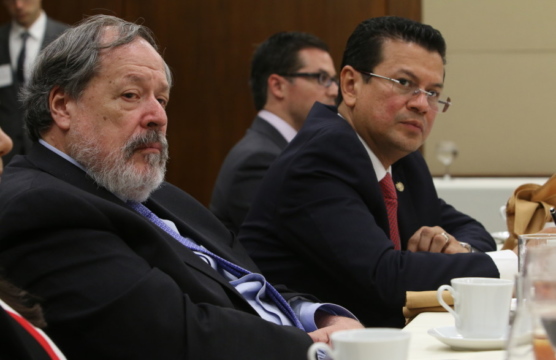Will the New US Aid Plan for Central America Be Successful?
Will Central American governments spend the money effectively? Do the countries in the isthmus have a good plan to fight the drug cartels?
This post is also available in: Español
As the impacts of climate change mount worldwide, the countries of Central America's Northern Triangle (El Salvador, Guatemala, and Honduras) face disproportionate vulnerability to severe weather events and other threats such as drought and food insecurity. This vulnerability is contributing to a growing humanitarian crisis in a region already wracked by poverty, inequality, and violence and is exacerbating these drivers of migration within and from the region, including to the United States. In response to this challenge, the Inter-American Dialogue’s Task Force on Climate Change in the Northern Triangle convened a diverse set of perspectives to inform a series of policy reports. These publications, two of which are published (the first here and the second here), and a third of which is forthcoming, outline the effects of climate change on key sectors and vulnerable communities and provide recommendations for the United States as it prioritizes addressing the root causes of regional migration.
On May 4 and 5, a delegation of task force members traveled to DC to share their insights and recommendations with officials from various US government entities. These included the US Agency for International Development (USAID)'s Northern Triangle Task Force and LAC Office of Regional Sustainable Development, the International Development Finance Corporation (DFC), the Department of State's Bureau of Western Hemisphere Affairs, the Office of the Special Presidential Envoy for Climate, and congressional staff from the House Foreign Affairs Committee, the Senate Foreign Relations Committee, and other offices including that of Sen. Tim Kaine, chair of the Senate Western Hemisphere Subcommittee. The delegation consisted of:
Meetings began with a presentation on the findings of the task force project given by Lisa Viscidi, non-resident senior fellow and senior manager in the government and public services practices at Deloitte, and MK Vereen, assistant for the Energy, Climate Change & Extractives Industries Program. This was followed by a Q&A session with task force members moderated by Nate Graham, interim director of the Energy, Climate Change & Extractive Industries Program.
[caption id="attachment_123899" align="alignleft" width="300"]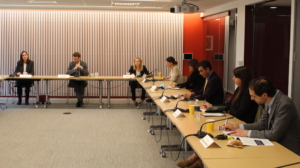 Meeting with USAID[/caption]
Meeting with USAID[/caption]
Over the course of these exchanges, task force members stressed that structural political and economic issues present core underlying barriers to climate adaptation. These include asymmetries in political and economic power and widespread corruption that has captured weak public institutions in favor of extractive and criminal interests. Pointing to how these issues have weakened conservation efforts, driven increases in deforestation and land insecurity, and criminalized environmental activism, task force members called upon the US to wield its influence to root out political corruption as a prerequisite to effective adaptation.
[caption id="attachment_123907" align="alignright" width="300"]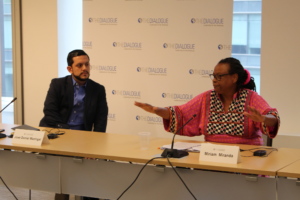 José Daniel Madrigal (L) and Miriam Miranda (R)[/caption]
José Daniel Madrigal (L) and Miriam Miranda (R)[/caption]
The task force also recommended increasing engagement directly with local governments – given the challenges of working with national governments – and with civil society organizations. The latter often lack the technical and financial capacity to execute adaptation projects or even access funding sources, despite possessing the greatest knowledge of how communities and marginalized groups can and must adapt to climate impacts. A lack of cohesive, intersectoral environmental movements has also weakened and fragmented efforts to improve land and water management and protect the region’s natural resources in a way that builds resilience. The United States could fill this gap by supporting spaces for dialogue and coordination. The task force also recommended incubators as a way to build the capacity of youth climate organizations, which are not always included at the table, to advocate for a more inclusive and robust response to the climate crisis.
[caption id="attachment_123903" align="alignleft" width="200"]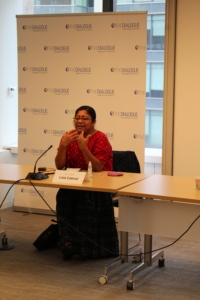 Lola Cabnal[/caption]
Lola Cabnal[/caption]
Task force members also emphasized the need to increase economic formalization and democratize access to finance in the region. The region’s economy is marked by high levels of informality (above 75 percent) and severe inequality and concentration of wealth. Ameliorating these conditions is critical to driving sustainable growth and providing a social safety net when disaster strikes. This is particularly urgent for women, young people, and Indigenous communities. Task force members cited unrecovered losses from Hurricanes Mitch, Eta, and Iota as examples highlighting the particular financial vulnerability these groups face in recovering from catastrophe.
[caption id="attachment_123911" align="alignright" width="300"]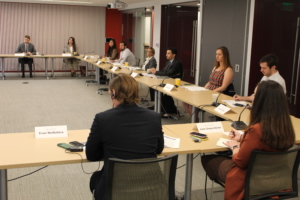 Meeting with Congressional Staffers[/caption]
Meeting with Congressional Staffers[/caption]
Indigenous communities also face particularly low access to education, a lack of employment opportunities, insecure land rights, and a reliance on subsistence farming which all hamper their ability to build resilience and in turn drive migration. According to task force members, investing in education in Indigenous communities is a necessity and could include adaptation-specific content such as soil management and other resilient agricultural practices. The task force underscored the need to work directly with Indigenous communities and to build their financial and technical capacity in a way that respects their culture and identity and leverages their traditional knowledge.
In response to these points, the US officials participating in the meetings affirmed their interest in understanding the needs of Northern Triangle countries and communities, as well as in expanding ongoing US efforts to build the region’s resilience to climate change. They also expressed a desire to continue interacting with task force members and to identify concrete ways to confront the issues discussed. Such collaboration is essential and represents a chance for greater US leadership in the region. The need for such partnership will also only grow more pressing as the climate crisis escalates and the Northern Triangle faces ever greater risks.
Will Central American governments spend the money effectively? Do the countries in the isthmus have a good plan to fight the drug cartels?
More than 52,000 Central American children, passing through Mexico, have sought entry into the US.
The outlook for the Northern Triangle is one of both optimism and apprehension.
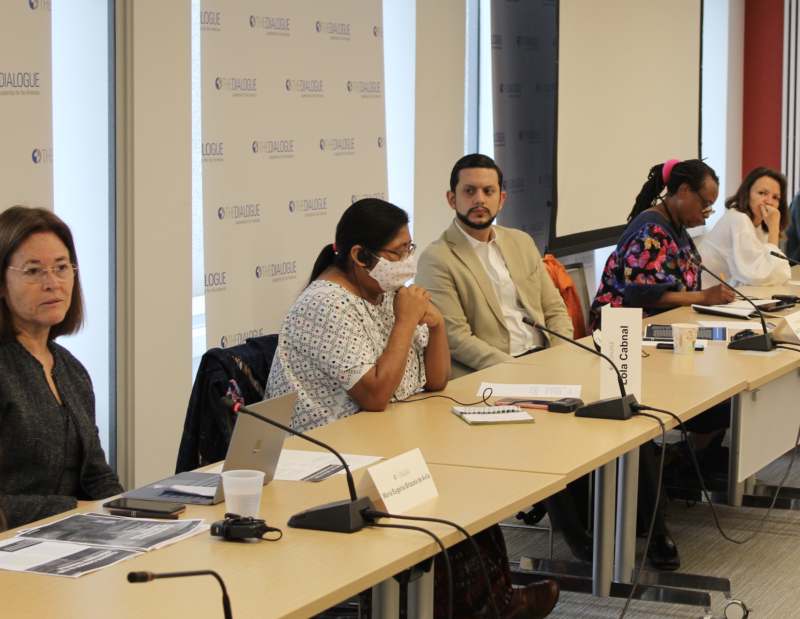 Photo: Gastón Ocampo / Inter-American Dialogue
Photo: Gastón Ocampo / Inter-American Dialogue
